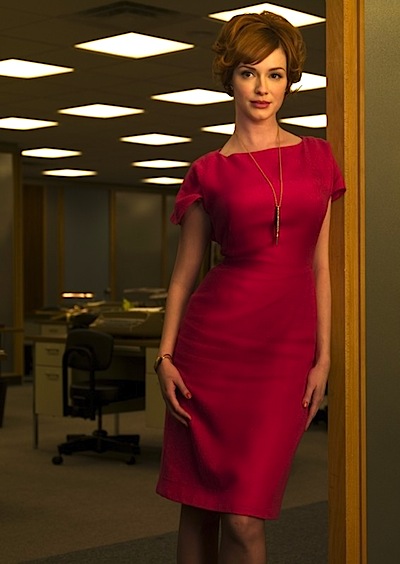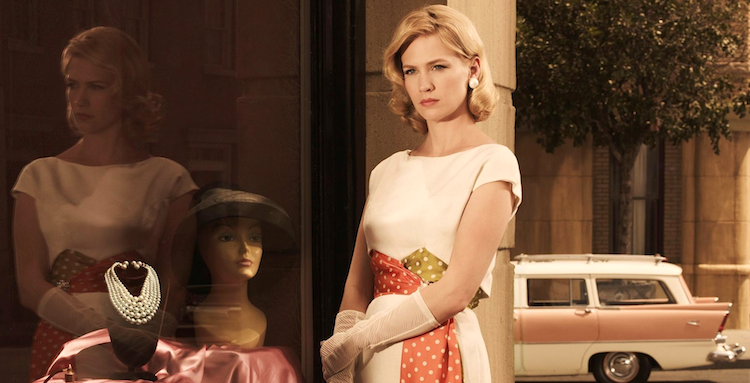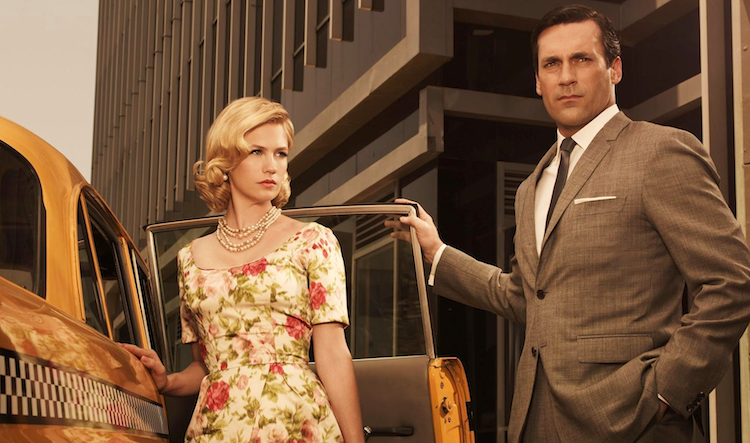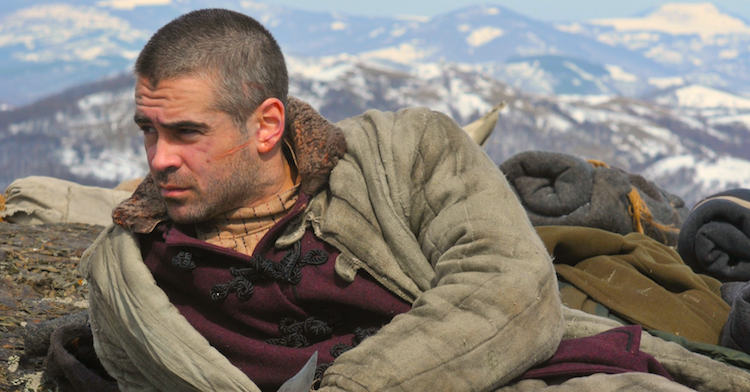[Editor’s Note: Mad Men Season 4 , reviewed in full here at LFM by Jennifer Baldwin, will be released on DVD/Blu-ray March 29th.]
By David Ross. Our own Jennifer Baldwin has written stylishly – very stylishly in my opinion – on Mad Men. I share her admiration for the glamour of the era, and I particularly share her instinct that the Eisenhower generation in some sense enabled the mayhem of the 60s:
The reason AMC’s original series Mad Men was such a sensation when it debuted four seasons ago, and what continues to make it one of the best shows on TV, is that it approaches the 1960s from a somewhat different angle. It’s the angle of men in suits, women in tasteful and elegant clothing, cocktails and business meetings – in other words, the world of grown ups. This is the 1960s from the point of view of the adults. What makes the show so brilliant is that by focusing on the adults of the era it shows where the real breakdown of society occurred in the 60s: not with the kids, but with their parents.
Kids will always rebel, in any era, in any time period. It’s part of our adolescent development to test boundaries and question our world. But it’s up to the adults in a society to maintain civilization in the face of this adolescent upheaval. Where the 60s went wrong – where the rot set in – wasn’t that the youth started tuning out and turning on, it’s that the adults did as well.
This is well put: it is indeed “up to the adults in a society to maintain civilization in the face of [… ] adolescent upheaval.” As I see it, however, the essence of the sixties dysfunction was not that the adults tuned out and turned on, but that they did not entirely trust in their own culture and world view. Their liberalism was too relativistic, pluralistic, urbane – too unsure of itself at root – and they had become unconsciously estranged from the tradition that should have functioned as the great countervailing force: the ‘culture’ that should have thundered in refutation of the ‘counter-culture.’ Too tentative to muster the necessary ferocity or tenacity, they failed to acculturate their own children, and they suffered the patricidal consequences.

The ultimate origin of the problem is hard to identify. Could it be that having won World War II and vanquished the most monstrous manifestation of evil in the history of the world, the Eisenhower generation let its guard down? Assumed that the culture needed no further defense? Or was this generation simply – and forgivably – a bit weary at the core?
There is a subtle point to be made, but Mad Men – of which I have seen only the first season – does not seem to make it. Instead, the show depicts the culture of the 50s and early 60s with a heavy-handed Baby Boomer bias, turning a complicated and often brilliant era of American art and culture – the era of Nabokov and Coltrane – into a flimsy straw man of political convenience, as if to say, “You see! This is why we had to wreck the world in order to save it!” I have previously aired something of this complaint in my “Defense of the 1950s” (see here).
I simply don’t accept the clichés in which Mad Men tirelessly traffics. My grandparents belonged to the exact generation of Mad Men and occupied a Jewish version of the same milieu. My grandfather was a corporate lawyer in Manhattan, a drinker of good Scotch, an amateur photographer (I have his lovely old Leica), a dapper wearer of Burberry coats and felt homburgs, a weekend golfer with a second house in Westport, Connecticut. Mad Men‘s revelry in boorishness and chauvinism – its excited finger-pointing at sexual naughtiness and latent dysfunction – seems utterly detached from my grandparents’ unselfconscious sophistication and from the real elegance of their world. This world was sober, thoughtful, and ordered. It was perhaps a bit passive and naively broadminded, but it was not stupid and never crude. It was a middle-brow world, but middle-brow, in 1960, encompassed the Museum of Modern Art, The New Yorker, and the New York City Ballet.
Daniel Mendelsohn, writing in The New York Review of Books, weighs in with a lengthy and devastating critique along my own lines. He derides the show as cheap soap opera, an obligatory point in the pages of NYRB and one that the show’s defenders are likely to concede with a shrug. He may touch a nerve, however, when he denies “the special perspective [the show’s] historical setting creates, the graphic picture that it is able to paint of the attitudes of an earlier time, attitudes likely to make us uncomfortable or outraged today.” Mendelsohn continues:
To my mind, the picture is too crude and the artist too pleased with himself. In Mad Men, everyone chain-smokes, every executive starts drinking before lunch, every man is a chauvinist pig, every male employee viciously competitive and jealous of his colleagues, every white person a reflexive racist (when not irritatingly patronizing). It’s not that you don’t know that, say, sexism was rampant in the workplace before the feminist movement; it’s just that, on the screen, the endless succession of leering junior execs and crude jokes and abusive behavior all meant to signal ‘sexism’ doesn’t work – it’s wearying rather than illuminating.
Here, as with Don’s false identity and (literally) meretricious mother, Mad Men keeps telling you what to think instead of letting you think for yourself. As I watched the first season, the characters and their milieu were so unrelentingly repellent that I kept wondering whether the writers had been trying, unsuccessfully, for a kind of camp, for a tartly tongue-in-cheek send-up of Sixties attitudes. (I found myself wishing that the creators of Glee had gotten a stab at this material.) But the creators of Mad Men are in deadly earnest. It’s as if these forty- and thirty-somethings can’t quite believe how bad people were back then, and can’t resist the impulse to keep showing you.
This impulse might be worth indulging (briefly), but the problem with Mad Men is that it suffers from a hypocrisy of its own. As the camera glides over Joan’s gigantic bust and hourglass hips, as it languorously follows the swirls of cigarette smoke toward the ceiling, as the clinking of ice in the glass of someone’s midday Canadian Club is lovingly enhanced, you can’t help thinking that the creators of this show are indulging in a kind of dramatic having your cake and eating it, too: even as it invites us to be shocked by what it’s showing us (a scene people love to talk about is one in which a hugely pregnant Betty lights up a cigarette in a car), it keeps eroticizing what it’s showing us, too. For a drama (or book, or whatever) to invite an audience to feel superior to a less enlightened era even as it teases the regressive urges behind the behaviors associated with that era strikes me as the worst possible offense that can be committed in a creative work set in the past: it’s simultaneously contemptuous and pandering. Here, it cripples the show’s ability to tell us anything of real substance about the world it depicts.
This critique is reasonable as far as it goes, but it misses the show’s water-carrying tendency in the larger campaign of the kulturkampf. The show does not represent the failure of the anthropological eye, but the triumph of the revisionist strategy by which the Baby Boomers have always justified their berserk torching of the culture. The show fails because it’s not fundamentally interested in its own subject matter except as the premise in a political syllogism. It has no real curiosity. No real affinity. Too often its portrait is an effigy brandished at a show trial.

It’s true that Mad Man depicts the nascent counterculture somewhat caustically, but I wonder whether this merely reflects the show’s implicit alignment with the perspective of the older generation. It seems to me we are supposed to understand that we witness the birth of the counterculture through Don’s eyes, and that the putative inadequacy of his comprehension is one more point against him and his generation.
I wish there were a corrective to adduce, but films like George Lucas’ American Graffiti and Barry Levinson’s Diner are a bit patronizing in their own way, envisioning an aimlessness and harmlessness that has nothing to do with the complexities that were roiling through the culture in a late efflorescence of modernism. For me, the defining tableau is an auditorium at Cornell, Nabokov at the lectern, Pynchon seated amid the crowd.
Posted on February 15th, 2011 at 9:20am.

